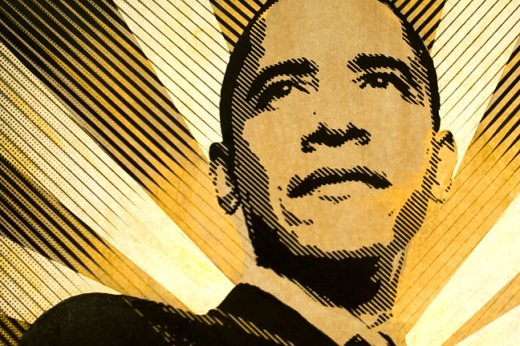
REUTERS: Democratic presidential candidate Barack Obama has opened up a 10-point lead over Republican opponent John McCain two weeks before the November 4 U.S. election, according to Wall Street Journal/NBC News poll released on Tuesday. The poll found 52 percent of voters favor Obama compared with 42 percent for McCain, up from a 6-point Obama edge two weeks ago, the Wall Street Journal reported. The 10-point lead is the largest in the Journal/NBC poll to date and represents a steady climb for Obama since early September, when the political conventions concluded with the candidates in a statistical tie, the newspaper reported. The poll also found that the popularity of Alaska Gov. Sarah Palin has fallen. Voters are less likely to see the Republican vice presidential nominee in a positive light, and much more likely to report negative feelings, the Wall Street Journal said. Forty-seven percent view Palin negatively, compared with 38 percent who see her in a positive light. Fifty-five percent of voters say Palin is not qualified to be president, up from 50 percent two weeks ago. The poll of 1,159 registered voters was conducted from Friday to Monday and has a margin of error of plus or minus 2.9 percentage points. MORE
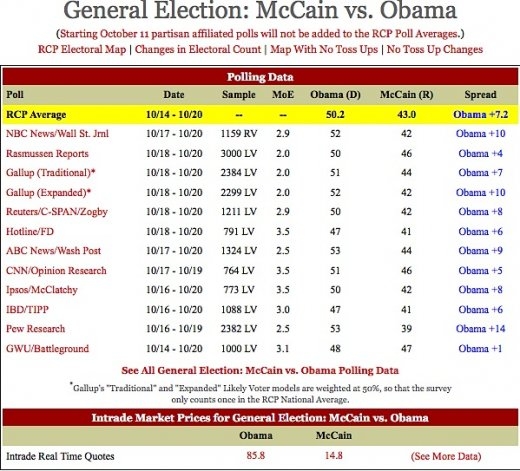
[Source: REAL CLEAR POLITICS]
NATIONAL JOURNAL: The metrics of this election argue strongly that this campaign is over, it’s only the memory of many an election that seemed over but wasn’t that is keeping us from closing the book mentally on this one. First, no candidate behind this far in the national polls, this late in the campaign has come back to win. Sure, we have seen come-from-behind victories, but they didn’t come back this far this late.
Second, early voting has made comebacks harder and would tend to diminish the impact of the kind of 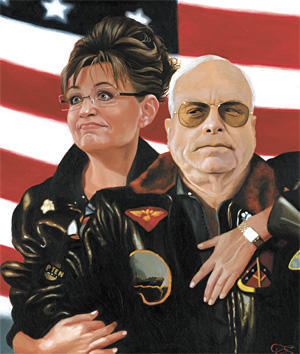 late-breaking development that might save McCain’s candidacy. With as many as one-third of voters likely to cast their ballot before Election Day, every day more are cast and the campaign is effectively over for them. The longer Obama has this kind of lead and the more votes are cast early, the more voters are out of the pool for McCain.
late-breaking development that might save McCain’s candidacy. With as many as one-third of voters likely to cast their ballot before Election Day, every day more are cast and the campaign is effectively over for them. The longer Obama has this kind of lead and the more votes are cast early, the more voters are out of the pool for McCain.
Third, considering that 89 percent of all voters who identified themselves as Democrats voted for John Kerry four years ago and 93 percent of Republicans cast their ballots for George W. Bush, the switch from parity between the parties to a 10-point Democratic advantage would seem to almost seal this outcome irrespective of the candidates fielded on each side. The unprecedented surges seen in Democratic party registrations in those states that require party affiliations confirm that.
Fourth, just look at the money and spending. With Obama now outspending McCain routinely by margins of 3- and 4-to-1 in advertising in so many states, it’s hard to see how the Arizonan’s campaign can drive a message. For a time, Obama was matching McCain one for one in negative advertising, then spending double or triple on top of that in positive advertising. Now Obama seems primarily doing positive ads, probably the right move given his lead going into this final stretch. Organizationally, it’s hard to find any state where McCain is organized as well as President Bush was four years ago or Obama is today, a product of both money and enthusiasm. MORE
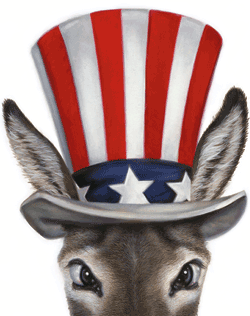 USA TODAY: Democrats are voting early in greater numbers than their Republican counterparts in several closely contested states, reversing a pattern that favored the GOP in past elections. The trend is evident in Ohio, North Carolina and Iowa, Nevada and New Mexico, state and county figures show. In Georgia, blacks are voting in greater numbers than they did in 2004. “This is like a mirror image of what we’ve seen in the past,” says Paul Gronke of the Early Voting Information Center at Reed College. “This cannot be good news for John McCain. It’s the 100-yard dash, and (Barack) Obama is already 20 yards ahead.” “It looks good for Barack Obama right now,” says Michael McDonald, an elections expert at George Mason University who tracks early voting patterns. MORE
USA TODAY: Democrats are voting early in greater numbers than their Republican counterparts in several closely contested states, reversing a pattern that favored the GOP in past elections. The trend is evident in Ohio, North Carolina and Iowa, Nevada and New Mexico, state and county figures show. In Georgia, blacks are voting in greater numbers than they did in 2004. “This is like a mirror image of what we’ve seen in the past,” says Paul Gronke of the Early Voting Information Center at Reed College. “This cannot be good news for John McCain. It’s the 100-yard dash, and (Barack) Obama is already 20 yards ahead.” “It looks good for Barack Obama right now,” says Michael McDonald, an elections expert at George Mason University who tracks early voting patterns. MORE
STRAIGHT OUTTA THE CATSKILLS: This Is No Laughing Matter
***
LAST CHANCE POWER TRY: The Battle For Pennsyltucky
NEW YORK TIMES: MOON TOWNSHIP, Pa. — People are scratching their heads: Why is Senator John McCain here? Senator Barack Obama has a double-digit lead in recent Pennsylvania polls. Senator John Kerry beat President Bush here in 2004. The previous three Democratic presidential candidates won, too. And this year there are 1.2 million more registered Democrats than Republicans in the state.
But in these frantic last weeks of the 2008 campaign, Mr. McCain has lavished time and money on this now deep-blue state — he made three stops here on Tuesday — as if his political life depended on it. And, from his  campaign’s point of view, it does. “We need to win Pennsylvania on Nov. 4, and with your help — with your help — we’re going to win!” Mr. McCain shouted to the crowd in his first appearance of the day, at a manufacturing plant in Bensalem, north of Philadelphia, where he said that Mr. Obama would raise their taxes and was too untested to handle an international crisis.
campaign’s point of view, it does. “We need to win Pennsylvania on Nov. 4, and with your help — with your help — we’re going to win!” Mr. McCain shouted to the crowd in his first appearance of the day, at a manufacturing plant in Bensalem, north of Philadelphia, where he said that Mr. Obama would raise their taxes and was too untested to handle an international crisis.
Mr. McCain’s strategists insisted that the state and its 21 electoral votes were within reach and crucial to what they acknowledge is an increasingly narrow path to victory. They say that their own polls show Mr. McCain only seven or eight percentage points behind Mr. Obama. (The state polls that show Mr. Obama with a double-digit lead, all conducted in recent weeks, include surveys by Marist, Quinnipiac, Rasmussen, SurveyUSA and The Allentown Morning Call.) Mr. McCain’s strategists argue that their candidate has a dual appeal: to the pro-gun working-class voters in the western coal country, many of whom supported Senator Hillary Rodham Clinton of New York in the Democratic primary, and to independents and moderates in the swing counties around Philadelphia. “When we look at our numbers, we think we’re competitive here,” Mark Salter, Mr. McCain’s closest adviser, told reporters in Harrisburg on Tuesday. He added, “We would like to get as many Clinton supporters as we can.”
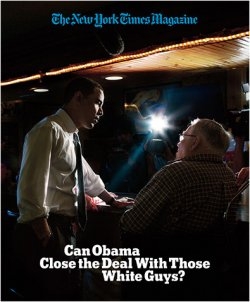 Another reason for Mr. McCain’s focus on Pennsylvania may be the shrinking electoral map, as Mr. Obama’s dominance leaves Mr. McCain with fewer and fewer competitive states to campaign in, and the need to avoid another embarrassing concession like Michigan, which the campaign abandoned early this month. Philadelphia is one of the only major cities in the country where Mr. McCain’s advertising campaign is anywhere near as voluminous as that of Mr. Obama’s. But even there, he lags nonetheless. On Tuesday, Mr. McCain effectively reduced his advertising campaigns in five other states — Colorado, Maine, Minnesota, New Hampshire and Wisconsin — in what Democrats suspected was an effort to divert resources to a more robust advertising effort here (though the savings from those moves had yet to show up in the state as of Tuesday night).
Another reason for Mr. McCain’s focus on Pennsylvania may be the shrinking electoral map, as Mr. Obama’s dominance leaves Mr. McCain with fewer and fewer competitive states to campaign in, and the need to avoid another embarrassing concession like Michigan, which the campaign abandoned early this month. Philadelphia is one of the only major cities in the country where Mr. McCain’s advertising campaign is anywhere near as voluminous as that of Mr. Obama’s. But even there, he lags nonetheless. On Tuesday, Mr. McCain effectively reduced his advertising campaigns in five other states — Colorado, Maine, Minnesota, New Hampshire and Wisconsin — in what Democrats suspected was an effort to divert resources to a more robust advertising effort here (though the savings from those moves had yet to show up in the state as of Tuesday night).
Conceding Pennsylvania two weeks before the election would be too much an admission of failure, said G. Terry Madonna, the director of the Center for Politics and Public Affairs at Franklin & Marshall College in Lancaster, where Mr. McCain appeared before a raucous rally of 7,000 people with his running mate, Gov. Sarah Palin, in September. “I think it psychologically devastates the entire national campaign if they decide they’re going to pull up stakes and walk away,” Mr. Madonna said. MORE
RELATED: Working For The Working Man Vote
